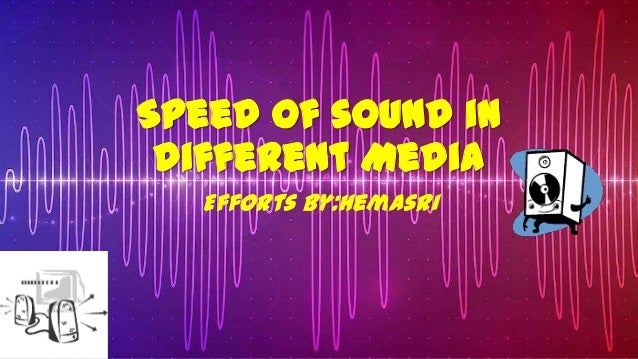

Speed dependent on receiver?.No*.Yes**.?* Speed dependent on source?.No.No.De Sitter As far as I understand it, and correct me if I'm wrong, there is no evidence that the speed of light is dependent on the speed of the receiver, regardless of the medium.į light speed is independent of receiver but sound speed is dependent), or they are the same, and both light speed and sound speed are independent of the receiver. My assumption was that either sound and light are different (i.e. This is kind of a viewpoint I hadn't considered.

The receiver has no impact either (though his perceived frequency is affected), except that we may care to inquire about the wave velocity relative to him, which is again obtained by addition.But in case of light in a physical medium, slowed down to significantly below c, I can't see why the same formulas as for sound waves wouldn't apply. But in case of light in a physical medium, slowed down to significantly below c, I can't see why the same formulas as for sound waves wouldn't apply. In the case of light in a vacuum, c survives any addition unharmed, so the result relative to any observer is always c.

I think the simplest way to view it is in the medium rest frame, then transform to whatever frame we are interested in. the receiver has no impact either (though his perceived frequency is affected), except that we may care to inquire about the wave velocity relative to him, which is again obtained by addition. Typically, we don't care about it (except for instance for supersonic emitters travelling faster than the wave the emit). the emitter movement wrt the medium has no impact on that (it does yield a shift in frequency but this is another matter - let's assume for simplicity that the wave velocity is independent of frequency here), but the wave speed relative to the emitter is impacted and can be calculated by addition. This brings an issue for light in vacuum, but it's ok since c is invariant anayway, so light propagates at c wrt the vacuum, whatever velocity we may arbitrarily assign to that vacuum.

the speed of the wave relative to its medium of propagation is constant. But, in case we are not given the values students must know such basic values as they might help in solving other problems as well.I think I agree with that other poster, but actually I am not sure we can make general statements (speed relative to what ? Is there a medium of progagation ? ) Note: Here we were given all the values which made the question very easy to answer. Now light is not a mechanical disturbance, it is a fundamental particle. If you hit one ball the ball will move and so will the other ball touching it. Imagine a space filled with balls like molecules. The speed of light is given as \.Īdditional Information: Sound is basically a mechanical disturbance in a medium. We are only expected to find the ratio of the given quantities. We have been given all the required data. On the other hand light does not need any medium to travel, which makes it faster than sound. We know that light is the fastest thing discovered till date. So, this seems to be a very easy question as the speed of sound and speed of light both are provided in the question. Hint: Here we have been asked to find the ratio of speed of sound to that of light and we have been asked the approximate value of the ratio.


 0 kommentar(er)
0 kommentar(er)
